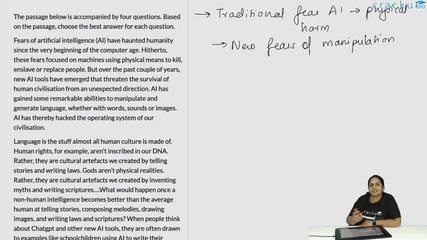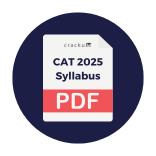The passage below is accompanied by four questions. Based on the passage, choose the best answer for each question.
Fears of artificial intelligence (AI) have haunted humanity since the very beginning of the computer age. Hitherto, these fears focused on machines using physical means to kill, enslave or replace people. But over the past couple of years, new AI tools have emerged that threaten the survival of human civilisation from an unexpected direction. AI has gained some remarkable abilities to manipulate and generate language, whether with words, sounds or images. AI has thereby hacked the operating system of our civilisation.
Language is the stuff almost all human culture is made of. Human rights, for example, aren’t inscribed in our DNA. Rather, they are cultural artefacts we created by telling stories and writing laws. Gods aren’t physical realities. Rather, they are cultural artefacts we created by inventing myths and writing scriptures….What would happen once a non-human intelligence becomes better than the average human at telling stories, composing melodies, drawing images, and writing laws and scriptures? When people think about Chatgpt and other new AI tools, they are often drawn to examples like schoolchildren using AI to write their essays. What will happen to the school system when kids do that? But this kind of question misses the big picture. Forget about school essays. Think of the next American presidential race in 2024, and try to imagine the impact of AI tools that can be made to mass-produce political content, fake news stories and scriptures for new cults…
Through its mastery of language, AI could even form intimate relationships with people, and use the power of intimacy to change our opinions and worldviews. Although there is no indication that AI has any consciousness or feelings of its own, to foster fake intimacy with humans, it is enough if the AI can make them feel emotionally attached to it….
What will happen to the course of history when AI takes over culture, and begins producing stories, melodies, laws and religions? Previous tools like the printing press and radio helped spread the cultural ideas of humans, but they never created new cultural ideas of their own. AI is fundamentally different. AI can create completely new ideas, completely new culture….Of course, the new power of AI could be used for good purposes as well. I won’t dwell on this because the people who develop AI talk about it enough….
We can still regulate the new AI tools, but we must act quickly. Whereas nukes cannot invent more powerful nukes, AI can make exponentially more powerful AI.… Unregulated AI deployments would create social chaos, which would benefit autocrats and ruin democracies. Democracy is a conversation, and conversations rely on language. When AI hacks language, it could destroy our ability to have meaningful conversations, thereby destroying democracy …. And the first regulation I would suggest is to make it mandatory for AI to disclose that it is an AI. If I am having a conversation with someone, and I cannot tell whether it is a human or an AI—that’s the end of democracy. This text has been generated by a human. Or has it?
The passage clearly highlights the potential risks associated with AI's linguistic capabilities, urging action to regulate its use. While the passage does present hypothetical scenarios and employs rhetorical questions, its tone is primarily grounded in a warning, not sensationalism or mere speculation. This points us towards Option A. The author systematically explains the dangers of unregulated AI tools, particularly their capacity to manipulate language and influence human culture. The warnings are thoughtful and aim to provoke awareness and a sense of urgency without excessive dramatisation. The tone is serious and measured, which aligns with a cautionary style.
The remaining tones do not describe the discussion appropriately. For instance, consider Option B: though the passage discusses AI's future implications, the focus is less on prediction and more on warning about what could happen if action is not taken. "Prescient" implies a focus on foresight and vision, but the passage emphasises immediate concerns and actionable advice. Similarly, the passage is not “alarmist” (Option C), as it avoids overly exaggerated or emotional claims. It uses logical arguments and examples rather than fearmongering. Option D is also a poor fit: although the passage concludes with a rhetorical question, this is a stylistic device rather than a defining characteristic of the tone. The primary goal is to issue a warning, not to leave the reader in a state of curiosity or wonder, making “quizzical” an incorrect characterisation.
Hence, Option A is the best choice.
Video Solution

Create a FREE account and get:
- All Quant CAT complete Formulas and shortcuts PDF
- 38+ CAT previous year papers with video solutions PDF
- 5000+ Topic-wise Previous year CAT Solved Questions for Free




